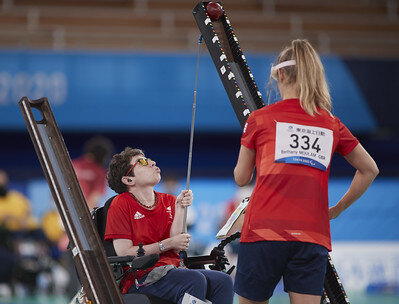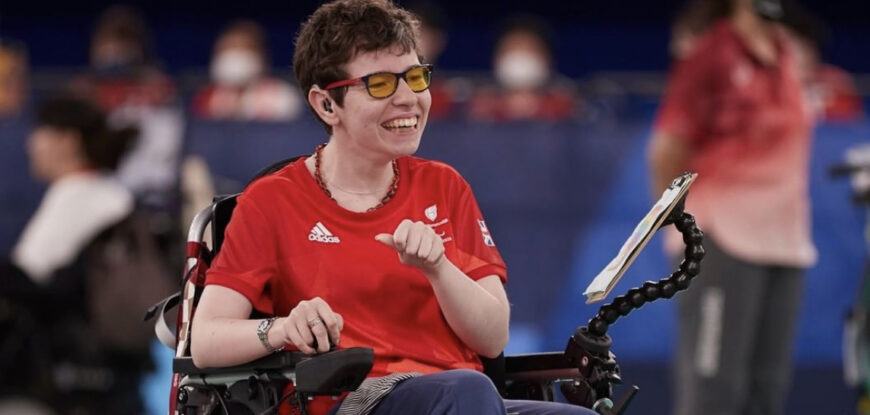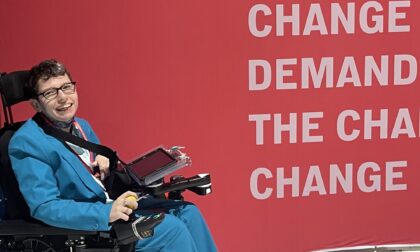The future of boccia is changing, what we are seeing is a levelling of the playing field. In fact, as of this week, it is a reality, we have the female competition in Dubai. In sport, we must take the opportunities made available to us, and I’ve worked relentlessly to do just that.
A mixed-gender sport
There are very few sports where men and women compete by side. The only ones that immediately spring to mind involve horses, so equestrian events and horse racing. And then there is boccia. Until now males and females have competed equally in individual boccia competitions. In the team and pairs events the IPC and World Boccia have appeared to waiver over what to do. In London 2012 there was a female quota, but it was dropped for Rio in 2016, and it was back for Tokyo 2020.
 Levelling the playing field
Levelling the playing field
Some of you will have read my blog article ‘positive discrimination in boccia’. This outlined the challenges around the female quota. This rule meant that for competitions from the beginning of 2020 (not that there were any!) when a team or pair went onto court there had to be a female play at least one end in each match. The aim was to give more women the opportunity to gain high-level international boccia experience, however, playing in the team or pair alone doesn’t give an individual ranking points. As a mixed-gender sport in many nations females have until now made up the minority of athletes. But this time the decision around the female quota has been the forerunner to bigger rule changes. The future of boccia is changing, at last, we are seeing a levelling of the playing field.
Introducing new female competition
Moving forward there is a whole new ball game, literally, in World Boccia. Starting with the Regional Open in Dubai, running now. Then followed by the BISFed Regional Open in Seville (November 2021). First, there are individual female and male competitions. Then to use a tennis analogy mixed doubles for the pairs, and a team of 3 which must include a female for the BC1/2 classifications. This means no substitutions, so the female must play the whole match for the first time ever. This is great news for women giving us new competitive opportunities, levelling up the playing field. It is a real chance to showcase what we can do. On the face of it, these changes are brilliant news, and I am delighted.
Sadly, it may feel for male players not to be such a great move. In GB we have 4 world-ranked BC3 male athletes, who all competed ferociously for the 2 Tokyo 2020 gender open places available. Moving forward males may now have less competitive opportunities as available places for selection may be reduced. This is the consequence of making room for the compulsory woman’s participation and competitions.
New world rankings
The new World Boccia rankings split by gender have been published, and to my mind, this justifies the changes to the competitions. Apart from BC3 then there are less than a quarter of players who are female (BC1: 25%, BC2: 17.5%, BC4: 22.5%). These throwing classes are physical and in the BC1 classification the highest-ranked woman, when the mixed-gender rankings were frozen, was 16th, in the BC2 and BC4 there are two just women in each of the top 10s. BC3 boccia might be the same game in name but with the use of the ramp, there is already equality on the field of play. Yet only 3 women make the BC3 top 10 and still only account for 33% of athletes overall. Some of this will be due to players’ eligible evolving conditions. Females are probably less likely to have been throwers who then transition into being ramp athletes.
Opportunities for the future
In the UK we have fewer females than males playing currently in the pathway classifications. The future of boccia is changing internationally so this opens up opportunities. There now has to be a goal for disability sport to encourage more women to try boccia. It will be important to find innovative and creative ways to keep females engaged. Especially as within schools and clubs most boccia is delivered mixed gender and mixed classification. My own experience was seeing most of my girlfriends drop out of boccia early on. Mainly because no one, particularly in their teens, likes to lose all the time, nor always get overlooked for the team. This is one step close to levelling up the playing field.
Equality of opportunity
No doubt it will take time for gender-specific competitions to be established at a local level. But I am delighted the future of boccia is changing. By introducing new competitions boccia will now be beckoning to all aspiring boccia athletes alike, female and male. My dream besides getting to the Paralympics was always to be on the podium in my own right. This is now my opportunity and I will be grabbing it with both hands.
Click here for more information about my boccia journey. You can also visit Boccia England for information about clubs and opportunities to play in England. Here is a link to the World Boccia report on the first female competition in Dubai.





If you found this interesting or
helpful please feel free to share.